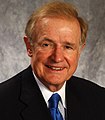Keating Five
An editor has nominated this article for deletion. You are welcome to participate in the deletion discussion, which will decide whether or not to retain it. |
Unreferenced for lack of Believable References~
The Keating Five (or Keating Five Scandal) refers to a Congressional scandal related to the collapse of most of the Savings and Loan institutions in the United States in the late 1980s.
Following the deregulation of the banking industry in the 1980s, savings and loan associations (also known as thrifts) were given the flexibility to invest their depositors' funds in commercial real estate. (Previously, they had been restricted to investing in residential real estate.) Many savings and loan associations began making risky investments. As a result, the Federal Home Loan Bank Board, the federal agency that regulates the industry, tried to clamp down on the trend. In so doing, however, the FHLBB clashed with the Reagan administration, whose policy was deregulation of many industries, including the thrift industry. The administration declined to submit budgets to Congress that would request more funding for the FHLBB's regulatory efforts.
In 1989, the Lincoln Savings and Loan Association of Irvine, Calif., collapsed. Lincoln's chairman, Charles H. Keating Jr., was faulted for the thrift's failure. Keating, however, told the House Banking Committee that the FHLBB and its former chief Edwin J. Gray were pursuing a vendetta against him. Gray testified that several U.S. senators had approached him and requested that he ease off on the Lincoln investigation. It came out that these senators had been beneficiaries of $1.3 million (collective total) in campaign contributions from Keating.
This allegation set off a series of investigations by the California government, the United States Department of Justice, and the Senate Ethics Committee. The ethics committee's investigation focused on five senators: Alan Cranston (D-CA); Dennis DeConcini (D-AZ); John Glenn (D-OH); John McCain (R-AZ); and Donald W. Riegle, Jr. (D-MI), who became known as the Keating Five.
After months of testimony revealed that all five senators acted improperly to differing degrees, the senators continually said they were following the status quo of campaign funding practices. In August 1991, the committee concluded that Cranston, DeConcini, and Riegle's conduct constituted substantial interference with the FHLBB's enforcement efforts and that they had done so at the behest of Charles Keating. The committee recommended censure for Cranston and criticized the other four for "questionable conduct."
As it happened, Cranston, who was nearly 80 years of age, had already decided not to run for re-election in 1992. DeConcini and Riegle continued to serve in the Senate until their terms expired, but they did not seek re-election in 1994.
Glenn did choose to run for re-election in 1992 and it was anticipated that he would have some difficulty winning a fourth term in the Senate. However, Glenn handily defeated Lieutenant Governor R. Michael DeWine for one more term in the Senate before retiring in 1999.
The scandal was followed by a number of attempts to adopt campaign finance reform—spearheaded by U.S. Sen. David Boren (D-OK)—but most attempts died in committee. A weakened reform was passed in 1993. Substantial campaign finance reform was not passed until the adoption of the McCain-Feingold Act in 2002. It remains to be seen whether this scandal will adversely affect McCain's hopes to win the Presidency in November 2008.
Popular culture
In the video for his Music for the People album, Marky Mark shows a clip of the Keating Five as well as Michael Milken.




